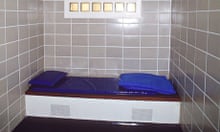Mentally ill teenagers will no longer be taken to police stations and detained in cells under reforms to be announced by the home secretary, Theresa May, this week.
An overhaul of the mental health laws in England and Wales will also ensure that police cells are used only as a place of safety for adults when their behaviour is so extreme they cannot be managed elsewhere.
The joint Home Office and Department of Health review of sections 135 and 136 of the Mental Health Act will also recommend reducing the maximum length of detention of someone in mental distress from 72 to 24 hours.
The announcement follows a dramatic social media complaint last month by the Devon and Cornwall police force that they were being forced to hold a 16-year-old girl with mental health problems in a cell for two days because there was no hospital bed available. She was eventually placed in an adult hospital bed.
The move is the culmination of a sustained drive by the home secretary to reduce the use of police cells as a “place of safety” for mentally ill people and boost the supply of health-based places of safety.
The use of police cells to hold mentally ill people has started to fall, dropping from 8,667 occasions in 2011-12 to 6,028 in 2013-14, but they are still being used instead of hospital beds or community places in more than a third of cases.
The problem is particularly acute for under-18s: 236 children who were sectioned last year were held in a police cell because of “a non-criminal health” issue.
The underlying problem is caused by a shortage of local health-based places of safety, which piles pressure on police cells. A quarter of health providers say there are not enough places to meet demand in their area and a majority – 105 – of local authorities with social services responsibilities have only one health-based place of safety.
These shortages mean mental health issues take up more than 20% of police time. Police cars rather than ambulances are used in more than 75% of cases to transport people to places of safety.
The joint review by May and the health secretary, Jeremy Hunt, will recommend amendments to legislation so under-18s are never taken to police cells if detained under mental health legislation.
It is understood that initially this will be done through a change in official guidance to the police to ensure that reform gets under way before the general election, though the pace of change will depend on health-based places of safety being available.
The review is also to amend section 136 of the act to ensure it can be applied anywhere except a private home. This means the current police power to remove someone from a public place if they think they have a mental illness and are in immediate need of care and control will also apply to railway lines, private vehicles, rooftops, hotel rooms and workplaces for the first time. The police will be required to consult a suitable health professional before detaining someone under section 136 if it is possible to do so.
It is understood that the health department has been encouraged to make extra resources available to create more beds for children and adolescents, which would be matched by significant savings in the police budget, making the move cost-neutral across government.




Comments (…)
Sign in or create your Guardian account to join the discussion